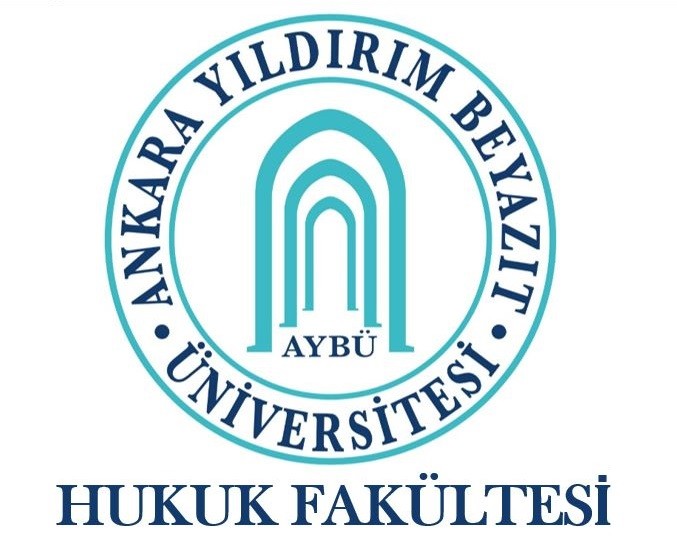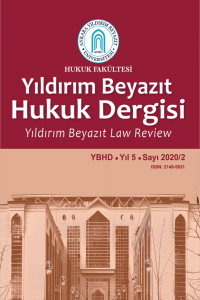Öz
Üretim ve yönetim aşamasında, hukuk bilgisi büyük önem arzetmektedir. Sürdürülebilir gelişmeler içinde, yenilik süreci ile hukuk arasında yakın bir ilişki bulunmaktadır. İnovasyon sürecinin ve yönetim aşamasının her safhası hukuki düzenlemelere dayanmaktadır. Mühendisler, üreticiler, yöneticiler, teknik işlerle uğraşan kişiler gelecekte karşılaşacakları sorunları önlemek ve üretim ve yenilik sürecinde hata yapmamak için hukuk kurallarının farkında olmalı ve görev alanları çerçevesinde bunları uygulamalıdırlar. Hukuki düzenlemeleri bilmek, yöneticilere ve idarecilere çeşitli şekillerde yardım eder. Buna göre, kendi haklarını ve yükümlülüklerini bilen yönetici, diğer tarafla güvenli bir şekilde hukuki işlem yapar ve zarara uğrama riski daha az olur, çalıştığı konularda yasal yükümlülüklerinin sınırlarını bilir. Faaliyetlerinin hukuken korumasını sağlar. Bunlara ek olarak, üretim aşamasında çevrenin korunması da dikkate alınmalıdır. Devletler tarafından çevre, iklim değişikliği, sürdürülebilirlik, atık yönetimi, yenilenebilir enerji vb. konularında imzalanmış birçok uluslararası anlaşma vardır. İnovasyon sürecindeki yöneticilerin ve idarecilerin bu karmaşık konuları ve bunlara ilişkin hukuki düzenlemeleri bilmesi gerekir. Bu makalede, sürdürülebilir gelişmeler içinde yeralan akademi, sanayi, siyaset, medya ve kültür temelli insanlar arasındaki bilgi dolaşımına ilişkin inovasyon sürecini tanımlayan dörtlü sarmal yenilik modeli tanıtılacaktır. Daha sonra, inovasyon süreci ile yakından ilgili, ulusal ve uluslararası hukuki düzenlemelerden ve uygulamadan örnekler verilerek konu açıklanacaktır .
Anahtar Kelimeler
Hukuki Bilgi Beşli Sarmal Yenilik Modeli Hukuk ve İnovasyon Yenilik Süreci Sürdürülebilir Kalkınma
Kaynakça
- Alıca, Süheyla Suzan (2011) “The Liability Principles in the Protection of Environment in the Frame of Supreme Court Decisions”. YUHFD (Yeditepe University Law Journal), I:1, V:8.
- Ansay, Tuğrul/Wallace, Don (2011) Introduction to Turkish Law, 6. Edition, Ankara, Wolters Kluwer/Seçkin.
- Aybay, Rona (2012) Introduction to Law. 4. Edition, Istanbul, Istanbul Bilgi University Press.
- Birnie, Patricia W./Boyle, Alan E./Redgwell, Catherine (1994) International Law and Environment, Oxford, Oxford University Press.
- Brown, Ralph S./Denicola, Robert C. (2005) Copyright, 9. Edition, New York, Foundation Press.
- Carayannis, Elias G/ Campbell, David F J (2010) “Triple Helix, Quadruple Helix and Quintuple Helix and How Do Knowledge, Innovation and the Environment Relate To Each Other?”, International Journal of Social Ecology and Sustainable Development, I:1, V:1, pp.41-69
- Chester, J.F./Hsu, Sophilia (2012). “Going Global: A Legal Primer for Innovation- and Knowledge – Based Companies”, International Trade Law Journal, Issue: 2, pp 3-20.
- Cornish, William (2006) Intellectual Property, 5. Edition, London, Thomson/Sweet&Maxwell.
- DiMatteo, Larry A. (2010). “Law as a Source of Strategic Advantage”, American Business Law Journal Vol. 47, Issue 4, pp. 727-794.
- Donato, Brian/Gossmeyer, Michele/ Moore, Kevin/Segger, Jon ((2018) “What do you need to know about cybersecurity”, AALL Spectrum, p.15-17.
- Dreyfuss, Rochelle Cooper/Kwall, Roberta Rosenthal/Strandburg, Katherine/Zimmerman, Diane L.(2010) Intellectual Property. 2. Edition, New York, Foundation Press.
- Eren, Fikret (2015) Law of Obligations, Istanbul, Yetkin.
- Fang, Anyu (2012) “Trademark Law and Industry Myths“, Journal of High Technology Law, 13, p. 88-136.
- Güneş Ceylan, Seldağ (2004) “The Effect of Roman Law on Modern Legal Systems”, Gazi University Law Review, I:1-2, V:8 (1-2), pp.75-93.
- Güneş Ceylan, Seldağ (2011) “The Affect of Classical Law Period on Corpus Iuris Civilis and The Reflections on Modern Laws”, Maltepe University Law Review, V:1-2, p.93-113.
- Güneş Peschke, Seldağ/Peschke, Lutz (2016) New Media and Law: A Comparative Study, Ankara, Yetkin. Goldstein, Paul/Reese, R. Antony (2008) Copyright, Patent and Trademark and Related State Doctrines, 6.Edition, New York, Foundation Press, p.17.
- Halliday, Simon/Morgan, Bronwen (2013) ‘I Fought the Law and the Law Win? Legal Consciousness and the Critical Imagination’, Current Legal Problems, I: 1, V.66, pp. 1-32.
- Hannes, Veinla (2000) “Codification of Environmental Law”, Juridica International 5, pp. 58-67.
- Kilian, Wolfgang (1981) “Victoria University of Wellington Law Review 11, p. 81-92.
- Marks, Susan (2011) “Law and the Production of Superfluity”, Transnational Legal Theory, I:1, V:2, pp.1-24.
- Mathias W./Mejlgaard, Niels (2015) Metrics and indicators of Responsible Research and InnovationProgress report D3.2. Monitoring the Evolution and Benefits of Responsible Research and Innovation (MoRRI), <https://www.rri-tools.eu/documents/10184/47609/MORRI-D3.2/> |a.d. 25.11.2019.
- Orozco, David (2010). “Legal Knowledge as an Intellectual Property Management Resource”, American Business Law Journal Vol. 47, Issue 4, pp. 686-726.
- Peschke, L. (2019). The Impact of Greta Thunberg on Environmental Communication in Germany. L. Peschke (Ed.) Visuality of the Anthropocene. A Concept for a Poster Exhibition. Norderstedt: BoD.
- Sands, Philippe/Peel, Jacqueline (2018), Principles of International Environmental Law, 4. Edition, Cambridge, Cambridge University Press.
- Schlicht, Ekkehart (1996) Firms, Markets, and Contracts, Heidelberg, Springer;
- Sims, Vanessa (2010) English Law and Terminology, 3. Edition, Baden Baden, Nomos, p.19
- Voigt, Paul/Von dem Bussche, Axel (2017) The EU General Data Protection Regulation (GDPR), Heidelberg, Springer.
- Von Schomberg, René (2013) “A Vision of Responsible Innovation”: Owen, Richard/Bessant, John/Heintz, Maggy (Editors), Responsible Innovation: Managing the Responsible Emergence of Science and Innovation in Society, Hoboken, NJ, Wiley. Wessel, Milton R. (1988) “What is Law Science and Technology Antway?”, Jurimetrics Journal 29, p. 259-267.
- Willis, Hugh Evander (1925) “Definition of Law”, Virginia Law Review 12, pp. 203-214.
Öz
Legal knowledge has great importance in every step of production and management. During the process of sustainable developments, a close relation between innovation process and law has to be considered. Every step of the innovation process and management depends on legal regulations. The engineers, producers, managers should be aware of law, to avoid problems in the future and not to make mistakes in the production and innovation process. To know the regulations help them in various ways. Accordingly, the knowledge about rights and obligations helps them to negotiate safely with the other parties. They know about the boundaries of their liabilities what they are working on. They keep the protection of their work especially on legal regulations. Additionally, during the production phase the protection of environment has to be considered. There are many international agreements which are signed by the States on environment, climate change, sustainability, waste management, renewable energy, etc. Managers and directors in the innovation process need to know about these complex issues. In this paper, the quintuple helix innovation model will be introduced which describes innovation process based on knowledge circulation between academia, industry, politics and the media- and culture based public for sustainable developments. Afterwards, relevant legal aspects of sustainable innovation process will be clarified by giving examples from the practice in national and international level.
Anahtar Kelimeler
legal knowledge innovation process Quintiple Helix Innovation Model Law and Innovation Sustainable Development
Kaynakça
- Alıca, Süheyla Suzan (2011) “The Liability Principles in the Protection of Environment in the Frame of Supreme Court Decisions”. YUHFD (Yeditepe University Law Journal), I:1, V:8.
- Ansay, Tuğrul/Wallace, Don (2011) Introduction to Turkish Law, 6. Edition, Ankara, Wolters Kluwer/Seçkin.
- Aybay, Rona (2012) Introduction to Law. 4. Edition, Istanbul, Istanbul Bilgi University Press.
- Birnie, Patricia W./Boyle, Alan E./Redgwell, Catherine (1994) International Law and Environment, Oxford, Oxford University Press.
- Brown, Ralph S./Denicola, Robert C. (2005) Copyright, 9. Edition, New York, Foundation Press.
- Carayannis, Elias G/ Campbell, David F J (2010) “Triple Helix, Quadruple Helix and Quintuple Helix and How Do Knowledge, Innovation and the Environment Relate To Each Other?”, International Journal of Social Ecology and Sustainable Development, I:1, V:1, pp.41-69
- Chester, J.F./Hsu, Sophilia (2012). “Going Global: A Legal Primer for Innovation- and Knowledge – Based Companies”, International Trade Law Journal, Issue: 2, pp 3-20.
- Cornish, William (2006) Intellectual Property, 5. Edition, London, Thomson/Sweet&Maxwell.
- DiMatteo, Larry A. (2010). “Law as a Source of Strategic Advantage”, American Business Law Journal Vol. 47, Issue 4, pp. 727-794.
- Donato, Brian/Gossmeyer, Michele/ Moore, Kevin/Segger, Jon ((2018) “What do you need to know about cybersecurity”, AALL Spectrum, p.15-17.
- Dreyfuss, Rochelle Cooper/Kwall, Roberta Rosenthal/Strandburg, Katherine/Zimmerman, Diane L.(2010) Intellectual Property. 2. Edition, New York, Foundation Press.
- Eren, Fikret (2015) Law of Obligations, Istanbul, Yetkin.
- Fang, Anyu (2012) “Trademark Law and Industry Myths“, Journal of High Technology Law, 13, p. 88-136.
- Güneş Ceylan, Seldağ (2004) “The Effect of Roman Law on Modern Legal Systems”, Gazi University Law Review, I:1-2, V:8 (1-2), pp.75-93.
- Güneş Ceylan, Seldağ (2011) “The Affect of Classical Law Period on Corpus Iuris Civilis and The Reflections on Modern Laws”, Maltepe University Law Review, V:1-2, p.93-113.
- Güneş Peschke, Seldağ/Peschke, Lutz (2016) New Media and Law: A Comparative Study, Ankara, Yetkin. Goldstein, Paul/Reese, R. Antony (2008) Copyright, Patent and Trademark and Related State Doctrines, 6.Edition, New York, Foundation Press, p.17.
- Halliday, Simon/Morgan, Bronwen (2013) ‘I Fought the Law and the Law Win? Legal Consciousness and the Critical Imagination’, Current Legal Problems, I: 1, V.66, pp. 1-32.
- Hannes, Veinla (2000) “Codification of Environmental Law”, Juridica International 5, pp. 58-67.
- Kilian, Wolfgang (1981) “Victoria University of Wellington Law Review 11, p. 81-92.
- Marks, Susan (2011) “Law and the Production of Superfluity”, Transnational Legal Theory, I:1, V:2, pp.1-24.
- Mathias W./Mejlgaard, Niels (2015) Metrics and indicators of Responsible Research and InnovationProgress report D3.2. Monitoring the Evolution and Benefits of Responsible Research and Innovation (MoRRI), <https://www.rri-tools.eu/documents/10184/47609/MORRI-D3.2/> |a.d. 25.11.2019.
- Orozco, David (2010). “Legal Knowledge as an Intellectual Property Management Resource”, American Business Law Journal Vol. 47, Issue 4, pp. 686-726.
- Peschke, L. (2019). The Impact of Greta Thunberg on Environmental Communication in Germany. L. Peschke (Ed.) Visuality of the Anthropocene. A Concept for a Poster Exhibition. Norderstedt: BoD.
- Sands, Philippe/Peel, Jacqueline (2018), Principles of International Environmental Law, 4. Edition, Cambridge, Cambridge University Press.
- Schlicht, Ekkehart (1996) Firms, Markets, and Contracts, Heidelberg, Springer;
- Sims, Vanessa (2010) English Law and Terminology, 3. Edition, Baden Baden, Nomos, p.19
- Voigt, Paul/Von dem Bussche, Axel (2017) The EU General Data Protection Regulation (GDPR), Heidelberg, Springer.
- Von Schomberg, René (2013) “A Vision of Responsible Innovation”: Owen, Richard/Bessant, John/Heintz, Maggy (Editors), Responsible Innovation: Managing the Responsible Emergence of Science and Innovation in Society, Hoboken, NJ, Wiley. Wessel, Milton R. (1988) “What is Law Science and Technology Antway?”, Jurimetrics Journal 29, p. 259-267.
- Willis, Hugh Evander (1925) “Definition of Law”, Virginia Law Review 12, pp. 203-214.
Ayrıntılar
| Birincil Dil | İngilizce |
|---|---|
| Konular | Hukuk |
| Bölüm | ÖZEL HUKUK MAKALELERİ |
| Yazarlar | |
| Yayımlanma Tarihi | 29 Temmuz 2020 |
| Yayımlandığı Sayı | Yıl 2020 Sayı: 2 |
Kaynak Göster
Cited By
Practices of Knowledge Exchange in the Context of the COVID-19 Pandemic
Journal of the Knowledge Economy
https://doi.org/10.1007/s13132-023-01537-w



